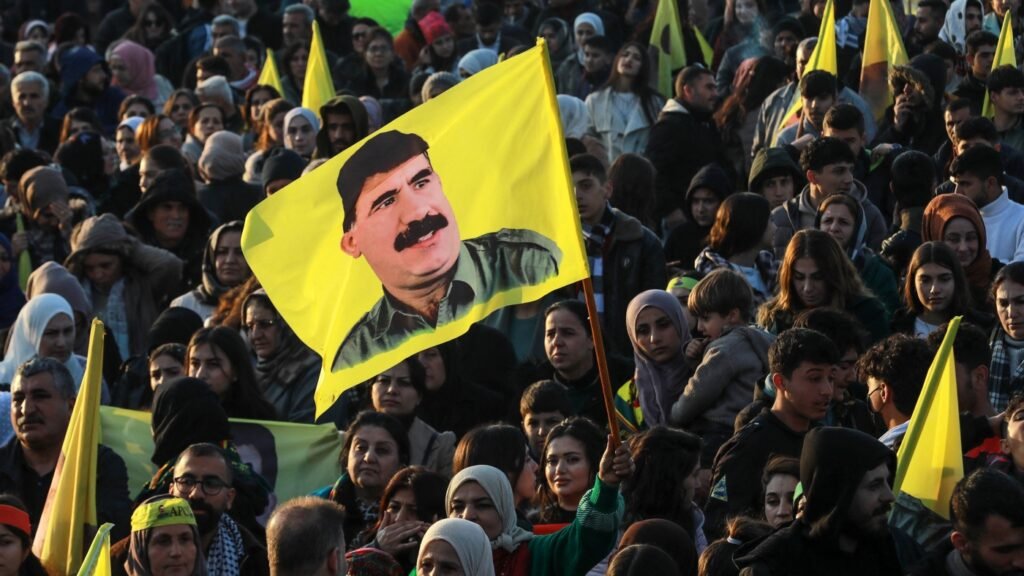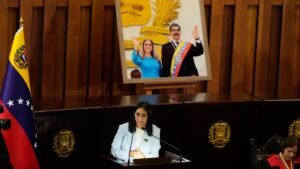Will the Kurdish militant group PKK’s ceasefire maintain? : NPR


A lady waves a flag bearing an image of the founding father of the Kurdistan Employees’ Occasion (PKK) Abdullah Ocalan, as individuals collect within the Kurdish-majority metropolis of Qamishli in northeastern Syria to hearken to a message from the jailed chief on Feb. 27. Ocalan referred to as for his Kurdish militant drive to disband and his fighters to put down their arms.
Delil Souleiman/AFP by way of Getty Photographs
disguise caption
toggle caption
Delil Souleiman/AFP by way of Getty Photographs
Militants from the Kurdish ethnic group who’ve fought an insurgency in opposition to Turkish authorities for greater than 4 many years have declared a ceasefire, in what could characterize a major political breakthrough for Turkish President Recep Tayyip Erdoğan.
The announcement got here simply two days after the chief of the militant PKK group, Abdullah Ocalan, whom Turkey has held in jail since 1999, referred to as on his fighters to disarm.
The PKK, often known as the Kurdistan Employees’ Occasion, launched its battle in opposition to the Turkish state within the early Eighties, resulting from perceived ill-treatment of Turkey’s Kurdish minority. The battle has brought on hundreds of deaths within the greater than 40 years which have adopted.
The group has carried out solely smaller-scale assaults inside Turkey in recent times although, and has seen the Turkish army utilizing armed drones to drive a lot of its cadres throughout the mountain border into neighboring Iraq.
The transfer follows 18 months of seismic change within the area, following the Oct. 7, 2023, Hamas assaults on Israel and the response in Gaza; the battle between Israel and Hezbollah in Lebanon and the toppling of long-time Syrian President Bashar al-Assad by rebels who are actually constructing a brand new authorities in Damascus.
The most recent peace efforts involving Ankara and the PKK, which the governments of Turkey and plenty of European allies have designated a terrorist group, have been pushed in current months by political companions of President Erdoğan.
Erdoğan may have Kurdish help to run once more
Some analysts have stated public recommendations by Erdoğan’s political allies that Ocalan, the 75-year-old PKK chief, may very well be launched in return for a renunciation of violence, kind a part of an effort to woo Kurdish voters. Kurdish help is likely to be essential to change constitutional time period limits that bar Erdoğan from operating for re-election in 2028.
However Turkey’s largest authorized pro-Kurdish political get together has confronted elevated stress prior to now few months, with mayors belonging to the get together changed by Erdoğan-friendly appointees.
The ceasefire announcement does mark the primary concrete steps towards peace because the PKK and Turkish authorities deserted the final set of disarmament negotiations a decade in the past, however some analysts stay skeptical about its long run sturdiness.
“I would be shocked if something a lot comes out of this, however that may take years to see its manner by way of,” says Invoice Park, a visiting analysis fellow at King’s School London.
Park says PKK’s allies in Syria could not agree with this resolution, and that would complicate this announcement. “I am very skeptical — I do not see in Turkey any democratization, any change of coronary heart. The Kurdish native governments have been closed down — activists in jail, journalists in jail,” he says.
And he says there are divisions throughout the PKK, however many members could really feel they must associate with what Ocalan says due to his cult standing because the group’s long-time jailed chief.
Erdoğan, although, stated that Ocalan’s name this previous week for PKK fighters to place down their arms represented a “new section” in peace makes an attempt for the individuals of Turkey.
“There is a chance to take a historic step towards tearing down the wall of terror that has stood between [Turkish and Kurdish peoples’] 1,000-year-old brotherhood,” Erdoğan stated on Friday.
The dramatic adjustments in Syria additionally play a task
However the altering political and safety panorama in next-door Syria may be key to the group’s resolution, in line with Caroline Rose, a senior fellow on the Information Traces Institute, a overseas policy-focused assume tank headquartered in Washington, D.C.
“The occasions during the last three months, notably safety reform between the SDF and the brand new Syrian Military,” says Rose, “is likely one of the major the reason why we noticed the PKK lay down its arms and announce a ceasefire with Turkey.”
The Kurdish-led Syrian Democratic Forces — which has traditionally been sympathetic to the PKK, although it denies robust hyperlinks — could quickly be built-in into Syria’s new army forces.
In the meantime Syria’s new leaders are contemplating a task for Turkish army forces in efforts to root out ISIS inside their nation’s borders, Rose says. However given the mistrust of Erdoğan felt by many in northeast Syria, she acknowledged such a transfer “would, after all, make a number of Kurdish constituents uncomfortable.”
Kurds traditionally inhabit elements of contemporary day Turkey, Iraq, Syria and Iran.









